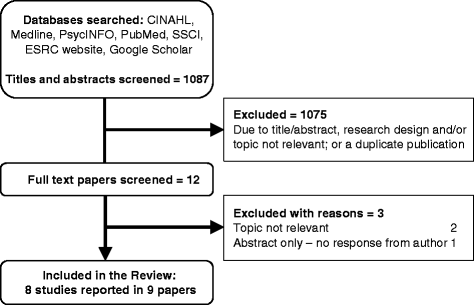Health professionals' perceptions of the barriers and facilitators to providing smoking cessation advice to women in pregnancy and during the post-partum period: a systematic review of qualitative research
- PMID: 27030251
- PMCID: PMC4815177
- DOI: 10.1186/s12889-016-2961-9
Health professionals' perceptions of the barriers and facilitators to providing smoking cessation advice to women in pregnancy and during the post-partum period: a systematic review of qualitative research
Abstract
Background: Reducing smoking in pregnancy is a policy priority in many countries and as a result there has been a rise in the development of services to help pregnant women to quit. A wide range of professionals are involved in providing these services, with midwives playing a particularly pivotal role. Understanding professionals' experiences of providing smoking cessation support in pregnancy can help to inform the design of interventions as well as to improve routine care.
Methods: A synthesis of qualitative research of health professionals' perceptions of the barriers and facilitators to providing smoking cessation advice to women in pregnancy and the post-partum period was conducted using meta-ethnography. Searches were undertaken from 1990 to January 2015 using terms for maternity health professionals and smoking cessation advisors, pregnancy, post-partum, smoking, and qualitative in seven electronic databases. The review was reported in accordance with the 'Enhancing transparency in reporting the synthesis of qualitative research' (ENTREQ) statement.
Results: Eight studies reported in nine papers were included, reporting on the views of 190 health professionals/key informants, including 85 midwives and health visitors. The synthesis identified that both the professional role of participants and the organisational context in which they worked could act as either barriers or facilitators to an individual's ability to provide smoking cessation support to pregnant or post-partum women. Underpinning these factors was an acknowledgment that the association between maternal smoking and social disadvantage was a considerable barrier to addressing and supporting smoking cessation
Conclusions: The review identifies a role for professional education, both pre-qualification and in continuing professional development that will enable individuals to provide smoking cessation support to pregnant women. Key to the success of this education is recognising the centrality of the professional-client/patient relationship in any interaction. The review also highlights a widespread professional perception of the barriers associated with helping women give up smoking in pregnancy, particularly for those in disadvantaged circumstances. Improving the quality and accessibility of evidence on effective healthcare interventions, including evidence on 'what works' to support smoking cessation in disadvantaged groups, should therefore be a priority. PROSPERO 2013: CRD42013004170.
Keywords: Health professionals; Meta-ethnography; Pregnancy; Qualitative research; Smoking; Systematic review.
Figures
Similar articles
-
The barriers and facilitators to smoking cessation experienced by women's partners during pregnancy and the post-partum period: a systematic review of qualitative research.BMC Public Health. 2015 Sep 3;15:849. doi: 10.1186/s12889-015-2163-x. BMC Public Health. 2015. PMID: 26335935 Free PMC article.
-
Health professionals' experience of teamwork education in acute hospital settings: a systematic review of qualitative literature.JBI Database System Rev Implement Rep. 2016 Apr;14(4):96-137. doi: 10.11124/JBISRIR-2016-1843. JBI Database System Rev Implement Rep. 2016. PMID: 27532314
-
Psychosocial interventions for supporting women to stop smoking in pregnancy.Cochrane Database Syst Rev. 2017 Feb 14;2(2):CD001055. doi: 10.1002/14651858.CD001055.pub5. Cochrane Database Syst Rev. 2017. PMID: 28196405 Free PMC article.
-
How to Implement Digital Clinical Consultations in UK Maternity Care: the ARM@DA Realist Review.Health Soc Care Deliv Res. 2025 May;13(22):1-77. doi: 10.3310/WQFV7425. Health Soc Care Deliv Res. 2025. PMID: 40417997 Review.
-
Factors that impact on the use of mechanical ventilation weaning protocols in critically ill adults and children: a qualitative evidence-synthesis.Cochrane Database Syst Rev. 2016 Oct 4;10(10):CD011812. doi: 10.1002/14651858.CD011812.pub2. Cochrane Database Syst Rev. 2016. PMID: 27699783 Free PMC article.
Cited by
-
"If the social circle is engaged, more pregnant women will successfully quit smoking": a qualitative study of the experiences of midwives in the Netherlands with smoking cessation care.BMC Health Serv Res. 2022 Aug 31;22(1):1106. doi: 10.1186/s12913-022-08472-7. BMC Health Serv Res. 2022. PMID: 36045362 Free PMC article.
-
Barriers and facilitators to smoking cessation in a cancer context: A qualitative study of patient, family and professional views.BMC Cancer. 2017 May 19;17(1):348. doi: 10.1186/s12885-017-3344-z. BMC Cancer. 2017. PMID: 28526000 Free PMC article.
-
Factors influencing the uptake and use of nicotine replacement therapy and e-cigarettes in pregnant women who smoke: a qualitative evidence synthesis.Cochrane Database Syst Rev. 2020 May 22;5(5):CD013629. doi: 10.1002/14651858.CD013629. Cochrane Database Syst Rev. 2020. PMID: 32441810 Free PMC article.
-
Family Planning and Preconception Care Service Management: The Key Role of Bulgarian GPs.Healthcare (Basel). 2024 May 27;12(11):1096. doi: 10.3390/healthcare12111096. Healthcare (Basel). 2024. PMID: 38891170 Free PMC article.
-
Accessing specialist support to stop smoking in pregnancy: A qualitative study exploring engagement with UK-based stop smoking services.Br J Health Psychol. 2022 Sep;27(3):802-821. doi: 10.1111/bjhp.12574. Epub 2021 Dec 1. Br J Health Psychol. 2022. PMID: 34852182 Free PMC article.
References
-
- World Health Organization. WHO Recommendations for the Prevention and Management of Tobacco Use and Second-Hand Smoke Exposure in Pregnancy. 2013. http://www.who.int/tobacco/publications/pregnancy/guidelinestobaccosmoke.... Accessed 19 Aug 2015. - PubMed
-
- NHS Health and Social Care Information Centre. Infant Feeding Survey – UK, 2010. 2012. http://www.hscic.gov.uk/catalogue/PUB08694. Accessed 27 Feb 2015.
Publication types
MeSH terms
Grants and funding
LinkOut - more resources
Full Text Sources
Other Literature Sources
Medical


